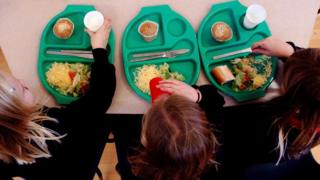
Image copyright
PA
Puddings should be banned from school meals if the Scottish government wants children to be healthier, say dentists.
The Faculty of Dental Surgery of the Royal College of Physicians and Surgeons of Glasgow wants excess sugar to be cut from school dinners.
It said that about a third of children suffer from dental decay, while three in 10 are overweight or obese.
Ministers say they will “carefully consider” the response to a consultation on the matter.
The faculty wants to see puddings taken off school lunch menus and replaced with soup or fruit, and is opposed to the idea of including sugar-free drinks on the list of permitted drinks for secondary school.
Faculty Dean, Prof Graham Ogden, said: “We fully support the positive intention of these proposed regulations, but we feel that the Scottish government should take a bolder approach if it’s to ensure that our young people have the healthiest possible start in life.”
‘Exclude diet drinks’
Prof Ogden added: “For example, we all agree that children should have greater access to more fruit and vegetables as part of their school day, but increasing access does not necessarily increase consumption.
“The guidance must include an evidence-based plan to ensure any increase in provision also ensures that our young people consume larger amounts of healthier food during school meals.
“We also know that diet drinks cause dental erosion, in addition to being a gateway to sugar. We should aim to ensure that our children’s oral health gets off to the best possible start in life.”
The faculty, which represents more than 1,000 dentists and trainees, has also called for action to ensure that all children and young people have access to facilities in schools to brush their teeth after meals.
Image copyright
Getty Images
The Scottish government said it would consider the faculty’s comments along with other responses received to make school food and drink healthier.
A spokesman said: “We want to make sure every pupil is equipped with the skills, knowledge and experience they need to make better health choices and live longer, healthier lives.
“This commitment is supported by a package of measures including Curriculum for Excellence and Better Eating, Better Learning.
“Schools have a key role to play but it is vital that we all provide consistent messages to children and young people as they learn how to take responsibility for their own health and wellbeing.”



